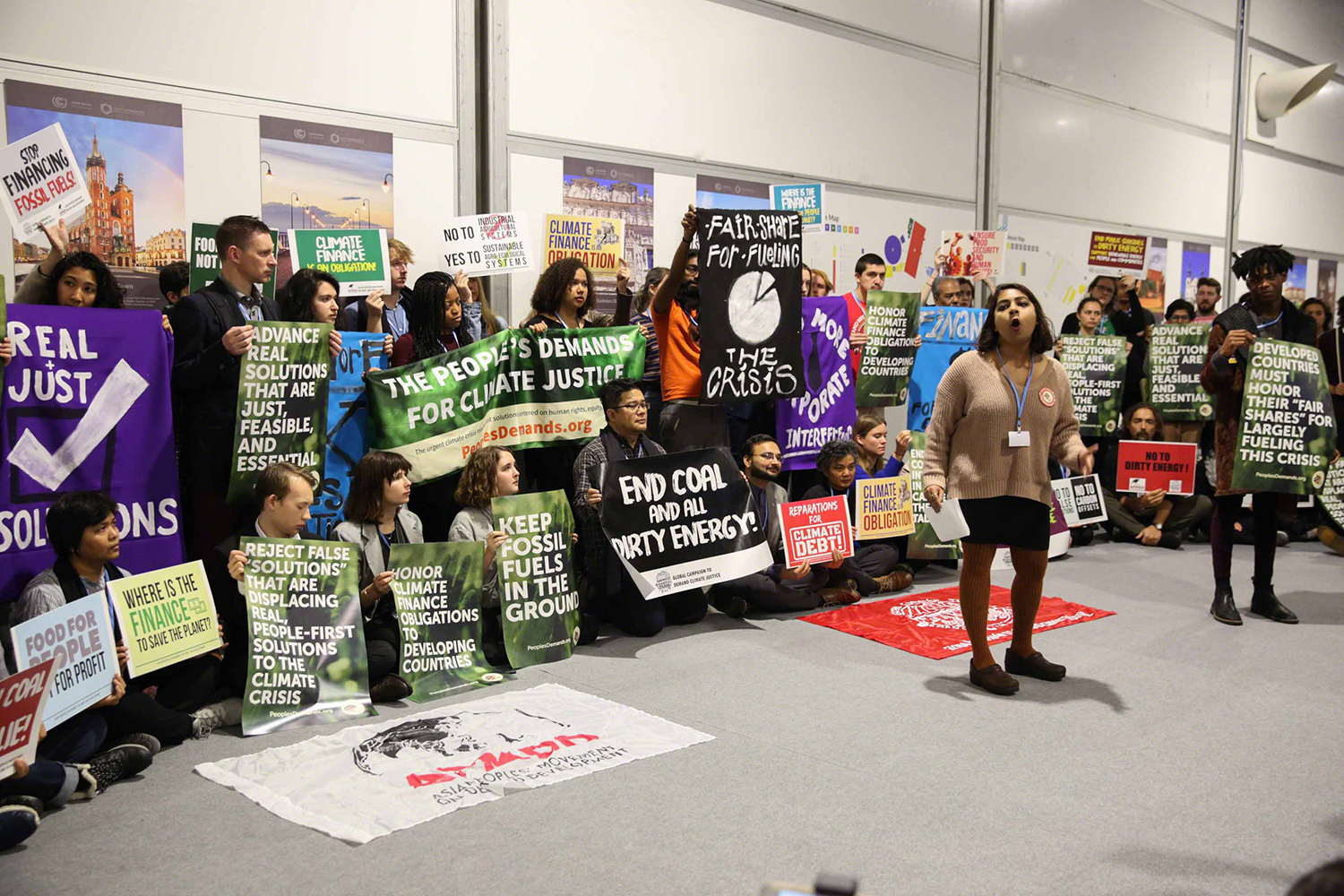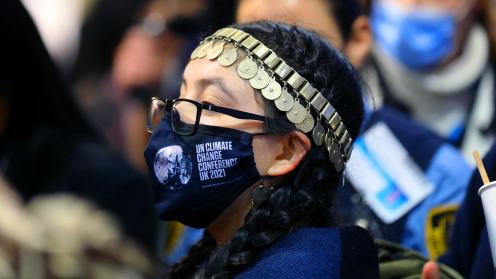About
Despite divisive negotiations at COP 26, parties managed to finalize the Paris Agreement Rulebook and adopt other substantive outcomes. During the closing plenaries, parties reflected that the overall package was not perfect, and many stressed that they were adopting the package “in the spirit of compromise.”
Final report
Summary report 31 October – 12 November 2021
All coverage

The Glasgow Climate Change Conference was a uniquely symbolic moment occurring in uncertain times. It was the first meeting of the Conference of the Parties (COP) to the United Nations Framework Convention on Climate Change (UNFCCC) to be held since the Paris Agreement took over from the Kyoto Protocol in 2020. It was also the first major UN environmental meeting to be held in person since the beginning of the Coronavirus pandemic.
The Conference was a signal of whether the Paris Agreement can adequately address the climate emergency. No formal negotiations took place in the preceding two years and the UK Presidency faced significant challenges to produce meaningful outcomes. As part of the “Road to Glasgow,” the Presidency convened informal dialogues among delegates and ministers, and the Chairs of the Subsidiary Bodies captured the progress of online consultations in informal notes.
Below, we highlight a few of the key issues that faced delegates at the Glasgow Climate Conference.
Climate Ambition
Countries submit pledges—called nationally determined contributions (NDCs)—to the Paris Agreement. There was an invitation, perhaps even an expectation, that countries would submit revised and more ambitious NDCs in 2020. By the end of 2020, there were 48 new NDCs submitted by 47 countries and the EU. Many were announced during the Climate Ambition Summit. Additional NDCs were submitted in 2021, notably from the United States, which pledges to reduce emissions by 50-52% below 2005 levels by 2030.
The UNFCCC Secretariat analyzed the NDCs submitted by the end of July 2021. The NDC Synthesis Report documents the effects of the new, updated NDCs that cover about 59% of parties to the Paris Agreement and account for 49% of global greenhouse gas emissions. The good news is that the NDCs represent a 12% decrease in emissions. The bad news is the pledges may lead to a temperature rise of 2.7°C by the end of the century. Some major emitting countries, including Australia, China, and India, have yet to submit new pledges and it is unknown if they intend to do so in Glasgow.
There were COP 26 agenda items that may address the need to increase ambition. On the COP agenda, there was an item on equitable, fair, ambitious, and urgent real emission reductions now consistent with a trajectory to reduce the temperature below 1.5 °C.
Related to raising ambition is the issue of common time frames, or how long NDCs will last. At COP 25 in Madrid in 2019, negotiations on this issue ended in a stalemate, after several options were put on the table. The options heading into COP 26 were outlined in the SBI Chair’s Scenario Note (June 2021) and included 5 years, 10 years, 5+5 years (5 year NDCs, with “indicative” NDCs submitted as well, among other interpretations), and different time frames for developed and developing countries. Many hoped at the June subsidiary bodies meeting this issue could be settled in Glasgow.
Climate Finance
Ten years ago, developed countries pledged to provide or mobilize USD 100 billion per year by 2020. The promise remains unfilled. Current estimates by Organisation for Economic Co-operation and Development (OECD) show USD 79.6 billion was provided or mobilized in 2019, roughly similar to 2018 levels. The Standing Committee on Finance published its fourth biennial assessment and overview of climate finance flows for discussion at COP 26.
Developing countries have linked the provision of finance to the success of COP 26. At COP 25 in Madrid, the African Group and China separately stated their willingness to withhold agreement on the priorities of developed countries (especially transparency issues) until finance was adequately addressed. Signals since then remained strong—for COP 26 to achieve progress on key issues, developed countries needed to build trust they will meet their financial pledges. The European Union has announced it would increase its contribution by EUR 4 billion and the US announced it would double its current commitment for a total of USD 11.4 billion a year by 2024.
There were many finance-related issues on the agenda. The Standing Committee on Finance presented its assessment of the needs of developing country parties to implement the Convention and the Paris Agreement. This was an important effort and the first time such an assessment was carried out under the UNFCCC.
Adaptation
The effects of climate change are clear. Developing countries have long argued that adaptation should be given the same amount of consideration and funding as mitigation. That balance is still elusive. Most climate financing, for example, goes to efforts to reduce emissions rather than to building resilience to climate change.
In 2019, the African Group requested a new agenda item on the Global Goal on Adaptation, which is enshrined in the Paris Agreement. That request was unsuccessful then, but was on the draft agenda of the CMA (the governing body of the Paris Agreement). Adaptation also featured quite heavily on the draft COP agenda.
Carbon Markets
When countries completed the “Paris Rulebook” in Katowice in 2018, one key piece was missing. The Rulebook included guidance and procedures to allow countries to interpret and implement the Paris Agreement in a similar way. But they could not find common ground on Article 6—a set of three issues that govern the trade in internationally transferable mitigation outcomes, a new market mechanism, and a framework for non-market based approaches.
Progress in the negotiations has remained slow. Without formal negotiations over the past two years, due to the COVID-19 pandemic, the UK Presidency convened a series of events, including technical workshops and ministerial roundtables to help negotiations to move forward in Glasgow. Expectations were muted going into COP 26. This issue is multifaceted and complex, with widely divergent views. Few expected to complete the negotiations at the Glasgow meeting, but there was hope for some progress.
What is the UNFCCC?
The international political response to climate change began with the 1992 adoption of the UN Framework Convention on Climate Change, which sets out the basic legal framework and principles for international climate change cooperation with the aim of stabilizing atmospheric concentrations of greenhouse gases (GHGs) to avoid “dangerous anthropogenic interference with the climate system.”
To boost the effectiveness of the 1992 UNFCCC, the Kyoto Protocol was adopted in December 1997. It committed industrialized countries and countries in transition to a market economy to achieve quantified emissions reduction targets. The Kyoto Protocol’s first commitment period took place from 2008 to 2012. The 2012 Doha Amendment established the second commitment period from 2013 to 2020.
In December 2015, parties adopted the Paris Agreement, which requires all parties to submit and regularly report on the nationally determined contribution (NDC) that each undertakes to reduce emissions and/or build resilience to climate change. Every five years, parties will conduct a “Global Stocktake” of their collective progress on mitigation, adaptation, and provision of support to developing countries.
The 2021 Glasgow Climate Change Conference was comprised of the 26th meeting of the Conference of the Parties (COP26) to the UNFCCC, the 16th meeting of the Conference of the Parties serving as the meeting of the parties to the Kyoto Protocol, CMP 16), the third meeting of the Conference of the Parties serving as the meeting of the parties to the Paris Agreement (CMA3), as well as meetings of the Subsidiary Body for Scientific and Technological Advice and the Subsidiary Body for Implementation.
The Glasgow Climate Change Conference was originally scheduled to take place in November 2020 but was postponed due to the COVID-19 pandemic.
View past and future events
Past event
11th Session of the Intergovernmental Negotiating Committee for a Framework Convention on Climate Change (INC/FCCC)
Past event
UNFCCC COP 1
Past event
1st Session of the Ad Hoc Group on the Berlin Mandate
Past event
1st Session of the UNFCCC Subsidiary Bodies (SB 1)
Past event
2nd Session of the Ad Hoc Group on the Berlin Mandate
Past event
1995 Year-end Update on UNFCCCC
Past event
2nd Session of the UNFCCC Subsidiary Bodies (SB 2)
Past event
3rd Session of the Ad Hoc Group on the Berlin Mandate
Past event
UNFCCC COP 2
Past event
5th Session of the Ad Hoc Group on the Berlin Mandate and 4th Session of the UNFCCC Subsidiary Bodies (SB 4)
Past event
5th Session of the UNFCCC Subsidiary Bodies (SB 5)
Past event
6th Session of the Ad Hoc Group on the Berlin Mandate
Past event
6th Session of the UNFCCC Subsidiary Bodies (SB 6)
Past event
7th Session of the UNFCCC Subsidiary Bodies (SB 7)
Past event
UNFCCC COP 3
Past event
UNFCCC COP 4
Past event
10th Session of the UNFCCC Subsidiary Bodies (SB 10)
Past event
UNFCCC COP 5
Past event
12th Session of the UNFCCC Subsidiary Bodies (SB 12)
Past event
13th Session of the UNFCCC Subsidiary Bodies (SB 13)
Past event
UNFCCC COP 6
Past event
UNFCCC COP 6 Part II
Past event
UNFCCC COP 7
Past event
16th Session of the UNFCCC Subsidiary Bodies (SB 16)
Past event
UNFCCC COP 8
Past event
18th Session of the UNFCCC Subsidiary Bodies (SB 18)
Past event
UNFCCC COP 9
Past event
Workshop on "Forests and Forest Ecosystems: Promoting Synergy in the Implementation of the Three Rio Conventions"
Past event
20th Session of the UNFCCC Subsidiary Bodies (SB 20)
Past event
UNFCCC COP 10
Past event
22nd Session of the UNFCCC Subsidiary Bodies (SB 22)
Past event
UNFCCC COP 11
Past event
24th Session of the UNFCCC Subsidiary Bodies and Associated Meetings
Past event
Nairobi Climate Change Conference – November 2006
Past event
26th Sessions of the Subsidiary Bodies of the UNFCCC and Associated Meetings
Past event
Vienna Climate Change Talks - August 2007
Past event
Bali Climate Change Conference - December 2007
Past event
Bangkok Climate Change Talks - March/April 2008
Past event
Accra Climate Change Talks - August 2008
Past event
Poznań Climate Change Conference - December 2008
Past event
Bonn Climate Change Talks - March/April 2009
Past event
Bonn Climate Change Talks - June 2009
Past event
Bonn Climate Change Talks - August 2009
Past event
Bangkok Climate Change Talks - September/October 2009
Past event
Barcelona Climate Change Talks - November 2009
Past event
Copenhagen Climate Change Conference – December 2009
Past event
Bonn Climate Change Talks - April 2010
Past event
Bonn Climate Change Talks - May/June 2010
Past event
Bonn Climate Change Talks - August 2010
Past event
Tianjin Climate Change Talks - October 2010
Past event
Cancún Climate Change Conference - November 2010
Past event
Bangkok Climate Change Talks - April 2011
Past event
Bonn Climate Change Conference - June 2011
Past event
Panama City Climate Change Conference - October 2011
Past event
Durban Climate Change Conference - November 2011
Past event
Bonn Climate Change Conference - May 2012
Past event
Bangkok Climate Change Conference - August 2012
Past event
Doha Climate Change Conference - November 2012
Past event
Bonn Climate Change Conference - April 2013
Past event
Bonn Climate Change Conference - June 2013
Past event
Warsaw Climate Change Conference - November 2013
Past event
Bonn Climate Change Conference - March 2014
Past event
Bonn Climate Change Conference - June 2014
Past event
Bonn Climate Change Conference - October 2014
Past event
Lima Climate Change Conference - December 2014
Past event
Geneva Climate Change Conference - February 2015
Past event
Bonn Climate Change Conference - August 2015
Past event
Bonn Climate Change Conference - October 2015
Past event
Paris Climate Change Conference - November 2015
Past event
Bonn Climate Change Conference - May 2016
Past event
Marrakech Climate Change Conference - November 2016
Past event
Bonn Climate Change Conference - May 2017
Past event
Fiji / Bonn Climate Change Conference - November 2017
Past event
Bonn Climate Change Conference - April 2018
Past event
Bangkok Climate Change Conference - September 2018
Past event
Katowice Climate Change Conference - December 2018
Past event
Bonn Climate Change Conference - June 2019
Past event
Latin America and Caribbean Climate Week 2019
Past event
Chile/Madrid Climate Change Conference - December 2019
Past event
June Momentum for Climate Change
Past event
UN Climate Change Dialogues 2020
Past event
Climate Ambition Summit 2020
Past event
2021 Sessions of the UNFCCC Subsidiary Bodies
Past event
Glasgow Climate Change Conference
Past event
Bonn Climate Change Conference - June 2022
Past event
Sharm El-Sheikh Climate Change Conference - November 2022
Past event
Bonn Climate Change Conference - June 2023
Past event
Middle East and North Africa (MENA) Climate Week
Past event
UN Climate Change Conference - United Arab Emirates Nov/Dec 2023
Past event
Bonn Climate Change Conference - June 2024
Past event
UN Climate Change Conference Baku - November 2024
To receive free coverage of global environmental events delivered to your inbox, subscribe to the ENB Update newsletter.
ENB images are free for use with attribution. For the Glasgow Climate Change Conference, please use Photo by IISD/ENB Mike Muzurakis.

